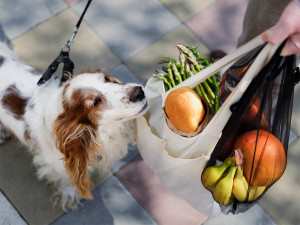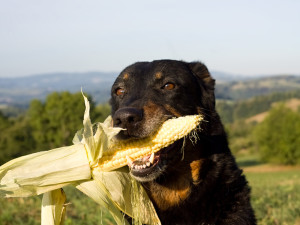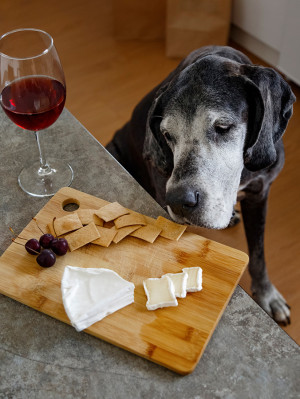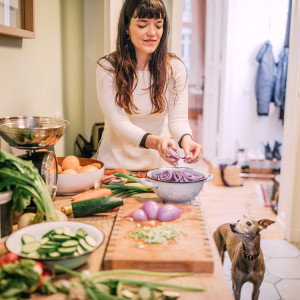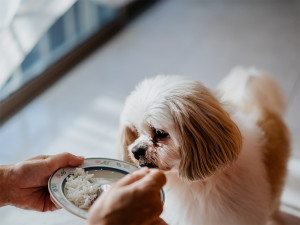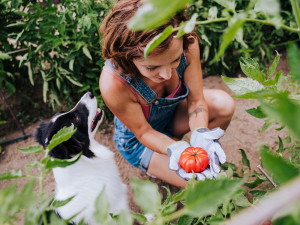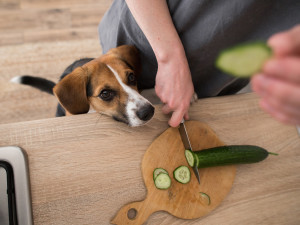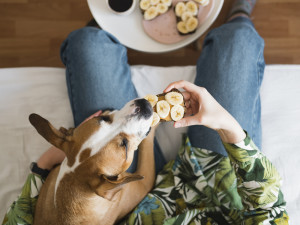Can Dogs Eat Potatoes?
We know they are your adorable little potato, but can they snack on one?
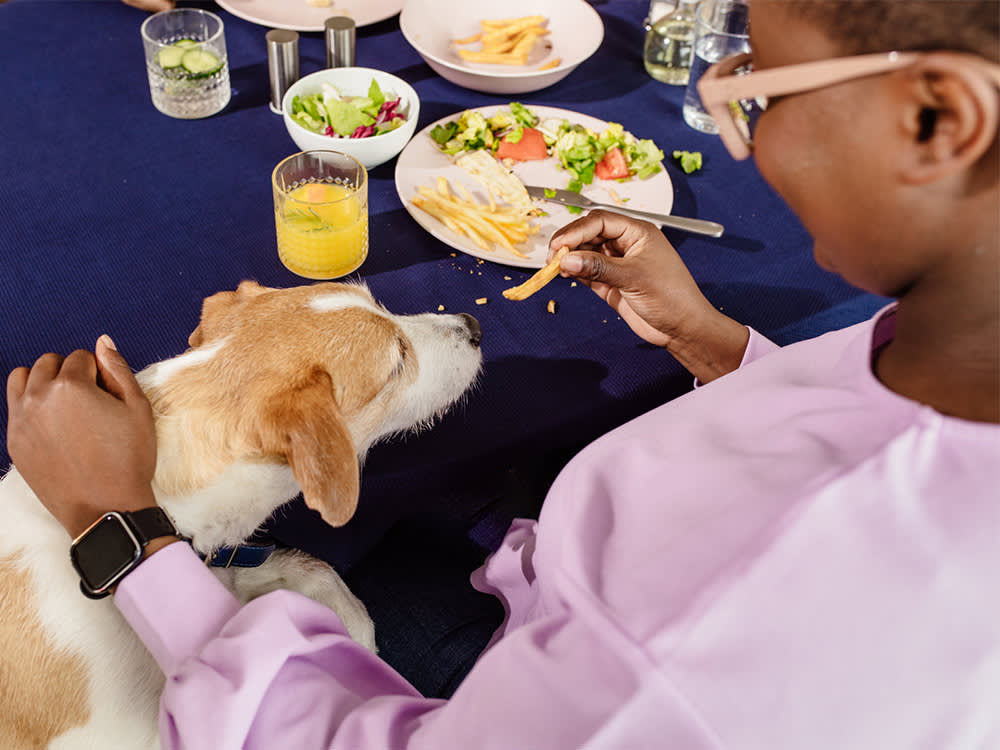
Share Article
The potato, a staple of so many cuisines with so many delicious ways to eat it, is safe for dogs in moderation as long as you stick to a few important guidelines. Baked, fried, mashed, boiled…there’s no end to the ways to eat potatoes — but when it comes to your pup, plain and simple preparations are going to be the safest options.
Sharing foods with your dog can be a fun way to enhance their diet and bring variety to their palate. There are many human foods that are safe and healthy to share with your dog, but there are also many foods that can make your pup sick. Therefore, always be mindful about what you are sharing and how you prepare foods that you intend to share with your pup to keep everyone feeling their best. Read on to learn all about sharing potatoes with your dog.
Nutrition facts about potatoes for dogs
Potatoes are tubers of the Solanum tuberosum plant. A tuber is the starchy part of the plant used to store energy and nutrients underground. Potatoes come in nearly endless varieties, with some of the most common ones being russets, yellow potatoes like Yukon golds, fingerling potatoes, red potatoes, and even purple potatoes.
In general, potatoes are considered starchy vegetables, although some newer nutritional guidelines classify them more like grainsopens in new tab. This is because their high starch content means they are rich in carbohydrates and they also don’t contain many of the other nutrients that other vegetables do.

When eaten in many of the ways we tend to prepare them, especially without the skin, they can cause spikes in blood sugar; the carbohydrates are quickly digested and broken down into sugars. Potatoes also contain some other important nutrients, including potassium, vitamin B6, and fiber. These nutrients are especially concentrated in the potato skin.
Are potatoes good for dogs?
Potatoes are just OK for dogs. They can provide some beneficial nutrients but should only be shared in moderation, because they are not as nutritious as other whole foods we can share with our pups. Most importantly, dogs need to eat a diet that is complete and balanced to provide all of the nutrients they need. If they fill up too much on table scraps or treats, they miss out on vital nutrients and this can lead to nutritional deficiencies and health problems.
Your dog’s main diet should be carefully balanced for this reason; all commercial dog food diets are required to include labeling that confirms they meet the AAFCO nutrient profiles or passed an AAFCO feeding trial to be considered complete and balancedopens in new tab. Potatoes are often an ingredient in commercial dog foods and home-cooking recipes; they do provide healthy sources of certain nutrients for dogs. This includes:
Starch: Potatoes are chock full of starch, a form of carbohydrate that dogs use as a source of energy. Dogs do not have a specific requirement for carbohydrates but because they are generally considered omnivores, they can use carbohydrates for energy. Carbohydrates are broken down into sugars, however, and too many simple carbohydrates can lead to weight gain, spikes in blood sugar, and risk of diabetes, so they should only be offered in moderation.
Potassium: Potassium is a mineral used throughout the body to maintain many critical functions. This includes a role in muscle contractions, maintaining normal blood pressure, and balancing fluid levels inside and outside of cells. Most of the potassium in potatoes is found in the skin.
B6: Also known as pyridoxine, vitamin B6 has many important jobs in the body. It is vital for heart health, brain function, and a strong immune system.
Fiber: While fiber is technically another carbohydrate, it is unique in that it is not completely broken down by the body and has many benefits for digestive health. Potatoes consumed with the skin contain both soluble and insoluble fiber. This means they help to provide bulk to the stool, reducing the risk of constipation, and creating feelings of fullness and satisfaction without adding additional calories or fat to the diet. They also provide important nutrients to the good microbes in the gut, helping to promote a healthy microbiome.
Can dogs eat raw potatoes?
Dogs should not eat raw potatoes. They are very tough to chew and swallow, creating a risk of choking. They are also very difficult to digest and can cause digestive upset including gas, bloating, nausea, vomiting, and/or diarrhea. In rare cases, large chunks of raw potato could also cause blockages in the stomach or intestines if they cannot be completely broken down.
Finally, raw potatoes as well as other parts of the potato plant may contain a toxic compound called Solanine. This is a glycoalkaloid, which is found in all plants of the nightshade family including tomatoes, eggplant, and the woody nightshade plant. In most cases, eating something with solanine results in drooling and digestive upset including vomiting and/or diarrhea.
In severe cases when a dog eats a very large amount of solanine, they can display neurologic signs like disorientation, sedation, weakness, and dilated pupils. Potatoes that are still green or have sprouts forming on them are more likely to contain high levels of solanine but any uncooked potatoes and parts of the potato plant should be kept out of reach of dogs to be safe.
Are potatoes completely safe for dogs?
Cooked, plain potatoes are safe for dogs in moderation. It is important to keep the following points in mind before sharing potatoes with your dog:
High carbohydrate content: Because this is a carb-heavy food, it should be shared in small amounts. Excessive carbohydrates can lead to weight gain and spikes in blood sugar. This is especially important to avoid in dogs who already are overweight, have joint pain, and/or are diabetic. If you are sharing potatoes with your dog, try to give them pieces with the skin on to add some helpful fiber and nutrients too. Or consider offering sweet potatoes for their additional health perks.
Beware of other ingredients: While plain cooked potatoes are safe for dogs, be mindful of how your potatoes are prepared. Other ingredients may not be as benign. For example, potatoes that are fried, heavily salted, or are mixed with butter, cheese, sour cream, garlic, onions, or other spices and seasonings can be problematic for dogs. Many of these ingredients put them at risk for digestive upset and others can be straight up toxic. The best option is to set aside some plain baked or boiled potato to share with your pup before you add any seasonings or other ingredients.
Solanine toxicity: Avoid letting your dog eat raw potatoes, potato plants, or any potatoes that are green or have sprouts. These can all contain the toxin Solanine which can make dogs sick.
The bottom line: Can dogs eat human food?
Dogs can safely eat many human foods. It is worth reiterating that dogs have their own unique nutritional needs that are different from ours. So while they may love sharing table food with you, they need to get the bulk of their diet from a complete and balanced diet intended for dogs. This ensures all of their nutritional needs are met and that they don’t develop any deficiencies. A good guideline to follow is to make sure treats and table scraps make up less than ten percent of your dog’s total calories. As long as their snacking is kept in check, dogs can enjoy both the flavors and nutritional boosts of many of your favorite snacks.
Be sure to double-check that anything you plan to share is safe and nontoxic to dogs and that it does not contain other ingredients or seasonings that could be harmful to your pup. So long as you stick to these principles, you and your dog can be lifelong snack buddies.
Other foods that are safe for dogs
Butternut squash can be a healthy and delicious snack to share with your pup
Apples are full of fiber and result in adorable crunching
Kale is a superfood for dogs too, just don’t overdo it
Other foods that are dangerous
Grapes and raisins are toxic to dogs and should always be avoided
Chocolate and these other foods are all off-limits for dogs
It may surprise you to learn that cheese isn’t great for dogs and should only be shared in small amounts
FAQs (People also ask)
How much potato can a dog eat?
Plain, cooked potatoes are safe in small amounts. It is not a balanced diet for a dog so should be limited to less than ten percent of your dog’s total daily calories.
Is it OK to give dogs potatoes?
Yes, plain cooked potatoes are safe for dogs.
Why do dogs like potatoes?
Dogs may be attracted to the texture of the cooked potato as well as the smell, especially if it is cooked with other aromatic ingredients.
Can dogs eat raw potatoes?
Dogs should not eat raw potatoes as they can be very difficult to chew and digest, and in some cases they may contain a toxin called solanin which can make them sick.
Are potatoes good for dogs?
Cooked potatoes with skin contain important nutrients and fiber that are good for dogs. Potatoes are high in carbohydrates however, which are not good for dogs in excess.
References:

Dr. Amy Fox, DVM
Amy Fox, DVM is a small animal veterinarian in New York City with over thirteen years of experience in a mixture of general practice, emergency medicine, and shelter medicine. A lifelong animal lover, Dr. Fox studied biology in college and then worked as a veterinary nurse before pursuing veterinary school at Cornell University. Her expertise includes surgery, dentistry, and management of chronic conditions, and she is interested in toxicology, pain management, nutrition, care of senior pets, and educational outreach. Dr. Fox also enjoys writing about veterinary medicine and teaching, and her work has previously appeared in Spruce Pets. In her free time, she loves to cook, garden, go for long runs, and hang out with her goofy mixed-breed dog May, who provides never ending comic relief!
Related articles
Can Dogs Eat Onions?
Add them to the list of no-nos in the kitchen. Here’s why.
![Pet owner feeding white rice to her Shih Tzu dog.]()
Can Dogs Eat Rice? And More Importantly, Should They?
Yes, actually. Just follow these guidelines.
![Various Veggie Chips in a Ceramic Blue Bowl]()
Can Dogs Eat Sweet Potatoes?
Add it to the list of healthy human superfoods pups can eat, too.
Can Dogs Eat Tomatoes?
Bite-size pieces of ripe, red tomatoes are safe—but you should skip the marinara sauce.
Can Dogs Eat Cucumbers?
That cuke crunch is irresistible. Learn if your dog can get in on that action.
Can My Dog Eat Bananas?
Yep — bananas are a healthy and delicious treat for your pup.

